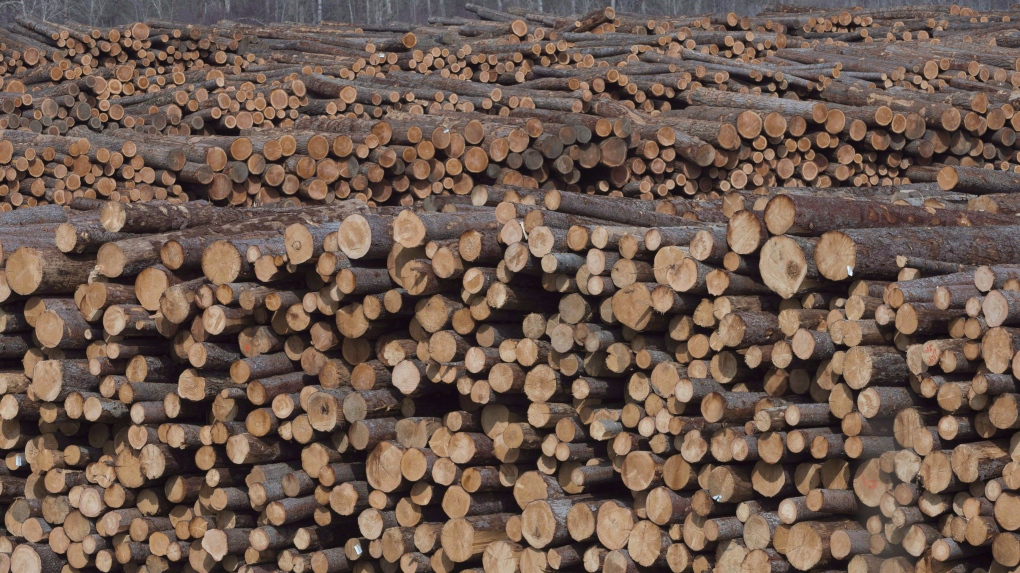B.C. forestry company must pay $343K fine for starting 2016 wildfire, court rules
 Softwood lumber is pictured at Tolko Industries in Heffley Creek, B.C., on April, 1, 2018. (THE CANADIAN PRESS/Jonathan Hayward)
Softwood lumber is pictured at Tolko Industries in Heffley Creek, B.C., on April, 1, 2018. (THE CANADIAN PRESS/Jonathan Hayward)
A British Columbia Supreme Court judge has upheld more than $343,000 in cost-recovery fines that were handed to a forestry company for starting a wildfire in 2016.
A decision posted Monday says the wildfire near Nazko, in central B.C., burned about four square kilometres after escaping from a debris pile that a contractor set on fire at a Tolko Industries cut block.
The court heard that four so-called holdover fires were reported by Tolko to the BC Wildfire Service for starting active fires in the spring of 2016.
The fires burned under the snow-covered ground for periods ranging from six weeks to five months after they were thought to have been put out, but the wildfire near Nazko was the only one that escaped the cut block.
Tolko initially won an appeal through the Forest Appeals Commission, which overturned the pay order saying the company was exempt under the Wildfire Regulation because it didn't intend to start the fire and it found the blaze was a result of forestry activity.
However, Supreme Court Justice Michael Brundrett says in his decision that the commission made a mistake when it interpreted “fire” to mean “wildfire,” separating the intentional act of starting the burn pile from the wildfire that resulted from it.
“The language does not require the person to intend to start a wildfire that accidentally spreads from a wilfully lit controlled fire,” he says in his decision.
“If one were to limit the cost recovery scheme to wilfully caused wildfires only (e.g., cases of arson), and to exclude roadside debris pile fires deliberately lit by industry participants that accidentally result in wildfires, the resulting cost recovery scheme would be so marginal in scope as to have almost no practical application.”
The Supreme Court decision says in general, timber harvesting results in a significant amount of debris piled along forest roads for subsequent disposal by burning, usually in winter.
Occasionally, it says “holdover fires” occur when debris piles continue to smoulder underground after a debris pile fire appears to be put out.
Tolko burned about 65,000 debris piles in the 2015-16 harvesting season, the documents say.
Tolko was initially handed a $15,000 administrative penalty plus a cost recovery order that included more than $343,000 in firefighting costs under the Wildfire Act, before challenging the cost recovery portion.
However, Brundrett says the cost recovery scheme does not give a free pass to those engaged in debris pile burning who accidentally start wildfires.
“In fact, the scheme appears designed to ensure the opposite.”
This report by The Canadian Press was first published Dec. 6, 2022.
CTVNews.ca Top Stories

Doctors say capital gains tax changes will jeopardize their retirement. Is that true?
The Canadian Medical Association asserts the Liberals' proposed changes to capital gains taxation will put doctors' retirement savings in jeopardy, but some financial experts insist incorporated professionals are not as doomed as they say they are.
Something in the water? Canadian family latest to spot elusive 'Loch Ness Monster'
For centuries, people have wondered what, if anything, might be lurking beneath the surface of Loch Ness in Scotland. When Canadian couple Parry Malm and Shannon Wiseman visited the Scottish highlands earlier this month with their two children, they didn’t expect to become part of the mystery.
Fair in Ontario, flurries in Labrador: Weather systems make for an erratic spring
It's no secret that spring can be a tumultuous time for Canadian weather, and as an unseasonably mild El Nino winter gives way to summer, there's bound to be a few swings in temperature that seem out of the ordinary. From Ontario to the Atlantic, though, this week is about to feel a little erratic.
What do weight loss drugs mean for a diet industry built on eating less and exercising more?
Recent injected drugs like Wegovy and its predecessor, the diabetes medication Ozempic, are reshaping the health and fitness industries.
He replaced Mickey Mantle. Now baseball's oldest living major leaguer is turning 100
The oldest living former major leaguer, Art Schallock turns 100 on Thursday and is being celebrated in the Bay Area and beyond as the milestone approaches.
What a urologist wants you to know about male infertility
When opposite sex couples are trying and failing to get pregnant, the attention often focuses on the woman. That’s not always the case.
'It was instant karma': Viral video captures failed theft attempt in Nanaimo, B.C.
Mounties in Nanaimo, B.C., say two late-night revellers are lucky their allegedly drunken antics weren't reported to police after security cameras captured the men trying to steal a heavy sign from a downtown business.
Bank of Canada officials split on when to start cutting interest rates
Members of the Bank of Canada's governing council were split on how long the central bank should wait before it starts cutting interest rates when they met earlier this month.
Made-in-Newfoundland vodka claims top prize at worldwide competition
A Newfoundland-made vodka has been named one of the world’s best by judges at this year’s World Vodka Awards.































